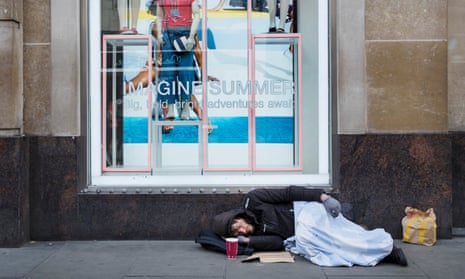Truth alone is not enough. It has been only too easy for campaigners and experts to amass abundant evidence of the damage wrought by austerity. The government has changed only its rhetoric. Put aside what the prime minister and chancellor say, and look at last month’s budget. Most government departments face drops in their real-terms spending per person for the next six years. Money that could have transformed the lives of the poorest has gone instead to tax cuts for the wealthy.
Moral arguments and even the invocation of self-interest – pointing out how divided, damaged and diminished the nation is becoming – have had little impact. Sometimes people must be shamed into action. That is why the report of the UN special rapporteur on extreme poverty and human rights is so important. Philip Alston is not the first to record that the UK government has inflicted “great misery” through “mean-spirited, and often callous” policies; that it has done so by choice; and that Brexit is set to make matters much worse. The difference is that his position and plain speaking have exposed this country before the world’s gaze. His scathing analysis is a call not only to conscience but to Britain’s self-respect.
It is shocking and shaming that 4 million people live more than 50% below the poverty line, and that the Institute for Fiscal Studies predicts a rise of 7 percentage points in child poverty between 2015 and 2022. It is scandalous that punitive benefits changes have been accompanied by the halving of funding to local authorities, destroying services that are needed more than ever. It is unpardonable that the costs of austerity have fallen so disproportionately upon the poor, women, ethnic minorities, children, single parents, and people with disabilities; Professor Alston suggested misogynists would be hard-pressed to find more ways of making the system fail women. It is indefensible that we deny people both dignity and hope.
He has described ministers as unconcerned; conversations have revealed a staggering level of ignorance and indifference. The government remains focused on unemployment, though almost 60% of those in poverty are in families where someone works. It has dismissed his report, with a spokesperson saying it “completely disagreed” with his findings and that household incomes are at a record high. One minister remarked that he had seen “some real poverty in some parts of the world”.
This is as inane as it is insulting to the 1.5 million people living in destitution. As Professor Alston noted, it is not just that so many people are in desperate circumstances but that they are in such circumstances in the world’s fifth-largest economy. To those who might attack this as kneejerk anti-capitalism, he argues that it is the safety net which keeps the system working, making sure there are still winners without abandoning the losers.
No one has to look hard to spot the growing numbers of rough sleepers and food banks. You just have to be willing to see – or be forced to do so. The true power of the images of hoses being turned on civil rights workers in the 1960s, noted the American writer Nikole Hannah-Jones last week, was that it shamed the US on the global stage: “That national embarrassment, not a sense of morality ... was what forced our nation to finally do something.”
Now Professor Alston has told us that the rising toll of child poverty is “not just a disgrace, but a social calamity and an economic disaster”. It is a national embarrassment that we needed a UN poverty envoy to spell out what is so evident. It will be a greater one if we refuse to pay heed.
This editorial was amended on 18 November 2018 to correct a statistical error.
